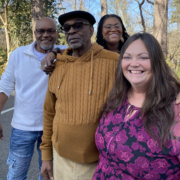SB 316, Alabama’s Prison Oversight Bill, Has Been Filed. Now Let’s Get It Passed.
More oversight, transparency, and accountability could be coming…

Providing Second Chances.
Through post-conviction and parole representation, Appleseed secures freedom for people serving extreme sentences under outdated laws.
Changing systems.
Alongside fellow Alabamians, we work to uplift marginalized communities, shape laws, and move Alabama forward.

We develop solutions and advocate for criminal justice reform at the Alabama Legislature.
Recent statewide wins include:
Our policy expertise also creates sweeping change at the local level.
We work to free Alabamians trapped by excessive sentences then provide dedicated reentry support.

 We listen to and support Alabamians directly impacted by harsh laws and broken systems.
We listen to and support Alabamians directly impacted by harsh laws and broken systems.